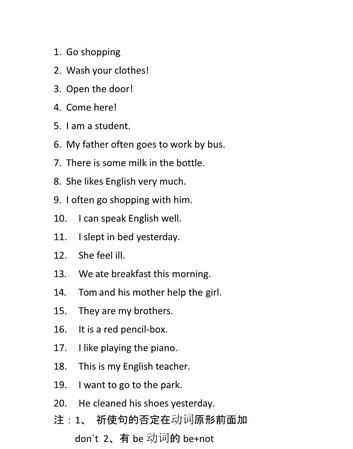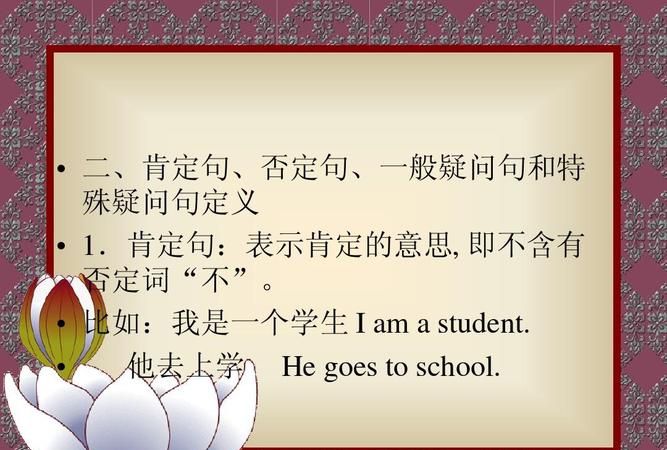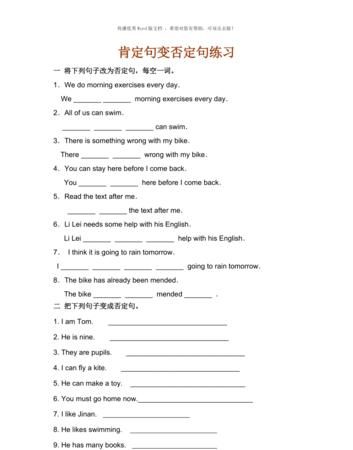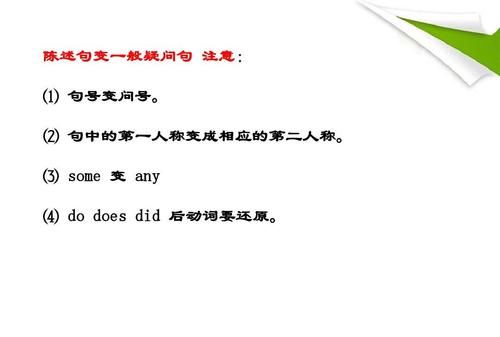本文目录
肯定句否定句一般疑问句特殊疑问句用英语怎么说
肯定句、Affirmative sentence
否定句:Negative sentence
一般疑问句 general question
特殊疑问句 special question

英语否定句的句子有哪些
否定句表示否定的句子,必须有否定词,那么你对英语否定句了解多少呢?以下是由我整理关于什么是英语否定句的内容,希望大家喜欢!
英语否定句的分类
(1)一般否定句
I don't know this. No news is good news.
There is no person(smoking)/not a person/not any person(smoking)in the house.
(2)特指否定
He went to his office, not to see him.
I am sorry for not coming on time.
I don't think / believe/suppose / feel / imagine you are right.
(3)部分否定
All the answers are not right
All is not gold that glitters
I don't know all of them.
I can't see everybody/everything.
Both of them are not right.
(4)全体否定
None of my friends smoke.
I can see nothing/nobody.
Neither of them is right.
Nothing can be so simple as this.
(5)延续否定
You didn't see him, neither/nor did I.
You don't know, I don't know either.
He doesn't know English, let alone / to say nothing of/not to speak of(更不用说)French.
(6)半否定句
We seldom/hardly/scarcely/barely hear such fine singing.
I know little English. I saw few people.
(7)双重否定
You can't make something out of nothing.
What's done cannot be undone.
There is no sweet without sweat.
No gain without pains.
I can't help /keep/ laughing whenever I hear it.
No man is so old but(that)he can learn.
(8)排除否定
Everyone is ready except you.
He did nothing but play.
But for your help, I couldn't do it.
(9)加强否定
I won't do it at all.
I can't see it any more.
He is no longer a bo
英语否定句的形式与用法
动词的否定转移
1.形式上否定主句的谓语,实际上是否定从句的谓语
当动词“think”、“believe”、“suppose”、“imagine”、“expect”、“feel”的主语是第一人称,谓语动词为没有任何副词修饰的一般现在时,它们的否定式实际上是对宾语从句的否定。表示说话者提出一种委婉的看法或主张。如:
I think that he will help us.——I don’t think that he will help us.
我认为它不会帮助我们。
I believe that he is right.——I don’t believe that he is right.
我认为他不对。
I suppose that he likes it.——I don’t suppose that he likes it.
我想他不喜欢它。
2. 形式上否定谓语动词,实际上否定复合宾语
当动词“think”、“believe”、“suppose”、“imagine”、“expect”、“feel”、“find”的主语是第一人称、谓语动词为没有任何副词修饰的一般现在时,它们前面的否定式实际上是对复合宾语的否定。表示说话者所提出的一种委婉的看法或主张。如:
I think math difficult. — I don’t think math difficult.
我认为数学不难。
I find the story interesting. — I don’t find the story interesting.
我认为这个故事没有趣。
I expect so. —I don’t expect so.
我认为不会。
注意:动词“think”、“believe”、“suppose”、“imagine”、“expect”、“feel”在下列情况下,否定不转移:
(1)这些动词跟其他另一个动词一起做并列谓语时,否定不转移。如:
I believe and hope he won’t do that.
我相信并且也希望他将不会那样做。
I feel and admit that we are not foolish.
我觉得并且也承认我们并不愚蠢。
(2)用于疑问句时,否定不转移。如:
Do you think it is not going to rain?
你认为天不会下雨吗?
Don’t you believe that he has done a good thing?
难道你不相信他做了一件好事?
(3)用作插入语时,否定不转移。如:
Li Lei, I think, won’t be angry with you.
我想李蕾不会生你的气。
Tom, I suppose, won’t be against it.
我猜想汤姆不会反对。
Mike, I believe, hasn’t seen the film.
我认为迈克没有看这场电影。
(4)动词前有其他副词修饰时,否定不转移。如:
I really don’t think it’s necessary for us to go there now.
我的确不认为我们有必要去那儿。
I feel strongly that he shouldn’t do such a thing.
我强烈地认为他不应该做那样的事。
(5)动词为非一般现在时或主语不是第一人称时,否定不转移。
I thought that he wouldn’t come back soon.
我原以为他不会回来得这么快。
She didn’t believe that he became a good boy.
她不相信它变成了一个好孩子。
He thinks that he isn’t fit for the job.
他认为他不适合这件工作。
He doesn’t believe that what we told him is true.
他不相信我们告诉他的事是真的。
(6)当宾语从句中含的否定为“not……at all”、“not a little”、“not a few”、“not enough”、“can’t help”等固定搭配时,否定不转移。如:
I think that he doesn’t know it at all.
我想他对那一点也不知道。
I suppose that it is not enough to remember the words if you want to learn the language well.
我认为如果你想把这门语言学好,那么只记单词是不够的。
I believe that you can’t help singing our national anthem when you win the first place in the Olympic Games.
我相信当你在奥运会上获得第一名时你会情不自禁地唱起国歌来。
(7)当宾语从句中含“no”、“nothing”、“nobody”、“nowhere”、“hardly”、“seldom”、“little”、“few”等否定词或半否词时,否定不转移。如:
I believe that nothing can make me give it up.
我想任何事情也不能使我放弃。
I think that no one can escape if the ship sinks in the sea.
我认为如果这艘船沉入海底的话,那么谁也逃不掉。
I suppose that he is a man of few words.
我猜想他是一个言语不多的人。
谓语的否定转移
有些句子形式上否定谓语动词,实际上是对句子后面状语进行否定。如:
Let’s not talk about it here.
我们别在这里谈吧。
Don’t read in the sun.
不要在阳光下看书。
Don’t talk with your mouth full of food.

英语否定句例子100个
英语否定句的例子10个?否定句分很多种,我就举些例子吧.
1.cannot/couldn’t或can /could +否定词(not,never,hardly,scarcely)too以及比较级等等。
I can’t wait to see him.我盼望着能早点见到他。
I could not feel better.我感觉再好不过了。
You cannot overemphasize the importance of it.其重要性无论怎么强调也不过分。
2.否定词(no,not,little,nothing,none,nobody)与 but,except等连用。
It leaves nothing to be desired.这已完美无缺。
Nobody but Peter can do it well.只有彼得才能做好这件事。
二、使用一些特殊的句式。
1.否定的一般疑问句。
Don’t you think we should try again?难道你不认为我们应该再试一试吗?
2.特殊疑问句。
There is a lift,but why not use the lift?既然有电梯,为什么不用呢?
3.过去时的no sooner...than句型。
No sooner had she got to Guangzhou,she called me.她一到广州就给我打了个电话。
4.too...to句型。
I’m only too glad to help you.能为您效劳,我高兴极了。
5.虚拟语气。
If I haven’t lost my watch!我的表要是不丢该多好!
6.含有not+表瞬间动作的动词+ till/until短语或从句。
We can’t go until Thursday.我们要到星期四才能去。
7.双重否定句。
There is no smoke without fire.无风不起浪。
理解肯定形式的否定意义借助一些词汇、短语和句型。
一、词汇和短语手段。
1.在名词及短语中,常见的有absence of(缺席,缺乏),stranger(陌生人)等。
Darkness is the absence of light.黑暗就是缺乏光亮。
2.动词及短语有escape(from)(逃过),ignore(忽略),lost(丢失)等。
I lost my book after getting offthe bus without it.当我没带书下了公共汽车之后才发觉把书丢了。
3.形容词及短语有last(不愿意的),deaf to(不听),blind to(看不见)等。
He is the last man I want to see.我最不愿意见到他。
4.介词及短语except,instead of, but,beyond,above,past等。
It’s quite beyond me(above me,past me,beyond my depth).这个我理解不了。
二、常用否定句型
1.too...to...,too...for...
That’s too much for me.这我可受不了啦。
2.stop(prevent,keep,hinder,protect,save,prohibit,dissuade)...(from)...
Smoking is prohibited in most theaters.在大多数戏剧院里禁止吸烟。
3.虚拟语气句。
You should(ought to)have done it better.你本应做得更好。(还不够好)
I could have come earlier.我本来能早点来的。(实际上没有早来)
I wish he were here now.我希望他现在能在这儿。(实际上他不在)
If I only knew!要是我知道该多好。(实际上不知道)
They would rather die than surrender.他们宁死不降。
4.用before引导的从句表示"来不及……,不等,未……先……,以防等否定含义。
Put on more clothes before you catch cold.多穿点衣服以防感冒。
5.预先安排的事未办到或计划落空。
I had hoped to save some more money to buy a new car.我本希望多攒点钱买辆新车。
6.用比较级句型表否定。
He knows more than he lets on.这件事他了解得很多,但不肯承认。
I know better than to believe him.我才不相信他那一套呢。

英语否定句都有哪些否定词
1:一般否定句
I don't know this.否定句式
No news is good news. 否定词no
There is no person smoking here.
2:特指否定
He went to his office, not to see him.
I am sorry for not coming on time.
I don't think/believe/suppose/feel/imagine you are right.
3:部分否定
All the answers are not right
All is not gold that glitters.
I don't know all of them.
I can't see everybody/everything.
Both of them are not right.
4:全体否定
None of my friends smoke.
I can see nothing/nobody.
Neither of them is right.
Nothing can be so simple as this.
5:延续否定
You didn't see him, neither/nor did I.
You don't know, I don't know either.
He doesn't know English, let alone/to say nothing of/not to speak of (更不用说) French.
6: 半否定句
We seldom/hardly/scarcely/barely hear such fine singing.
I know little English. I saw few people.
7: 双重否定
You can't make something out of nothing.
What's done cannot be undone.
There is no sweet without sweat.
No gain without pains.
I can't help /keep/ laughing whenever I hear it.
No man is so old but (that) he can learn.
8:排除否定
Everyone is ready except you.
He did nothing but play.
But for your help, I couldn't do it.
9:加强否定
I won't do it at all.
I can't see it any more.
He is no longer a boy.

以上就是关于一般否定句英语 ,肯定句否定句一般疑问句特殊疑问句用英语怎么说的全部内容,以及一般否定句英语 的相关内容,希望能够帮到您。

